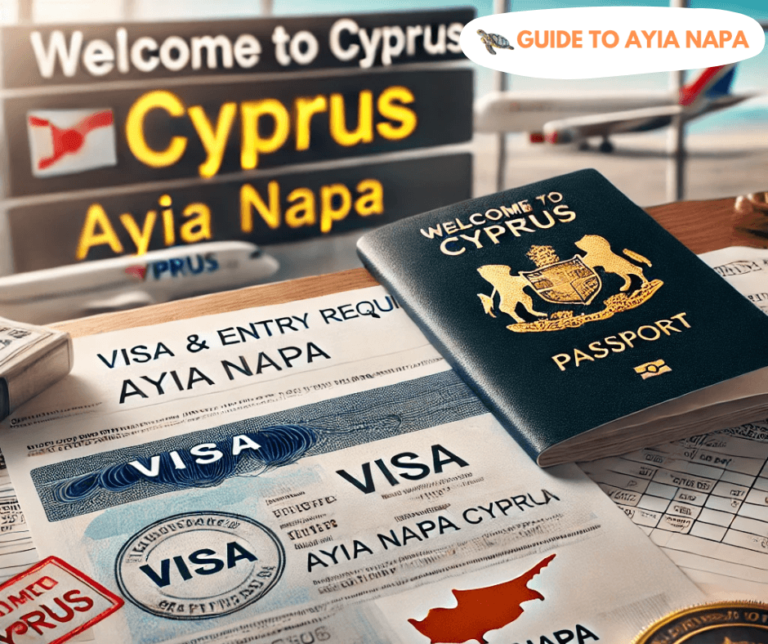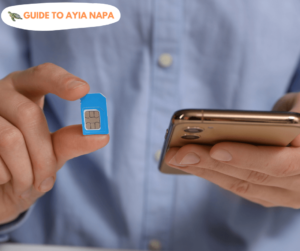If you’re an EU citizen or from Switzerland, Iceland, Liechtenstein, or Norway, you’re in luck—bring your passport or a national ID with a photo, and you’re in!
For everyone else, check if your country requires a visa here.
If you do need one, apply through the Cypriot Embassy.
How Long Can You Stay?
- EU/EEA citizens: Stay as long as you like.
- Non-EU visitors: Usually up to 90 days within 180 days (Schengen-style rules).
- Want to work? Get a work permit from the Civil Archive and Migration Office.
Special Rules to Watch Out For
- Only enter Cyprus through legal ports (Larnaca, Paphos, Limassol, etc.).
- Entering via Northern Cyprus airports/seaports is illegal, and you could face legal trouble.
- Bringing a pet? Make sure it has a valid health certificate (rabies shots included).
Now, let’s discuss visas, passports, and special regulations so you can plan your trip to Ayia Napa stress-free!

Who Needs a Visa?
Cyprus is part of the EU but not in the Schengen Zone, meaning visa rules can vary.
Here’s how it works:
- EU/EEA citizens: No visa needed.
- UK, US, Canada, Australia, and many others: No visa required for short stays (up to 90 days).
- Visa-required countries: Check the official Ministry of Foreign Affairs page.
For more extended stays, different visa types apply (student, work, or residency permits).
Entry Points: Avoid the Legal Pitfalls
Cyprus is divided, and the Republic does not recognize entry from the Turkish-occupied North.
If you enter via Ercan Airport (in the North), you could face legal trouble traveling to the South.
Only enter via these official ports:
✅ Larnaca & Paphos Airports
✅ Limassol, Larnaca, Paphos, and Latsi seaports
❌ Ercan Airport or any Northern Cyprus seaport = illegal entry
Traveling with Pets
Want to bring your furry friend? Here’s what you need:
- EU travelers: Pet passport or an Animal Health Certificate.
- Non-EU travelers: A vaccination certificate (especially for rabies).
- Banned dog breeds: Pit Bull Terrier, Tosa Inu, Dogo Argentino, Fila Brasileiro.
Make sure to inform customs 48 hours before arrival so they can inspect your pet on arrival.
Customs & Duty-Free Allowances
If you’re traveling within the EU, you can bring almost anything for personal use. But if you’re arriving from outside the EU, there are limits:
- Tobacco: 200 cigarettes or 250g of tobacco.
- Alcohol: 1 liter of spirits or 4 liters of wine.
- Goods: Up to €430 (€150 for travelers under 15).
Narcotics, counterfeit goods, weapons, and certain food products are strictly prohibited.
Final Thoughts: Get Ready for Ayia Napa!
Visa and entry rules might sound boring, but a little planning can prevent unexpected surprises at the border.
If you follow the rules, enter through the correct ports, and double-check your visa status, you’re all set for an unforgettable time in Ayia Napa!
Got more questions? Drop by the Cyprus Ministry of Foreign Affairs website for official details.
| Requirement | Details |
|---|---|
| Visa Required? | EU/EEA: No, Non-EU: Check at MFA Website |
| Max Stay Duration | 90 days within 180 for most non-EU visitors |
| Valid Entry Points | Larnaca & Paphos Airports, Limassol, Larnaca, Paphos, Latsi Seaports |
| Illegal Entry Points | Ercan Airport, Northern Cyprus Seaports |
| Traveling with Pets | Pet Passport (EU), Vaccination Certificate (Non-EU) |
| Duty-Free Allowances | 200 cigarettes, 1 liter of spirits, €430 worth of goods |
Do I need a visa to visit Cyprus?
If you’re from the EU, UK, US, Canada, or Australia, you can stay visa-free for up to 90 days. Others should check with the Cypriot Embassy.
Can I enter Cyprus via Northern Cyprus?
No! Entering via Ercan Airport or any Northern Cyprus port is illegal and may lead to legal issues. Use Larnaca or Paphos Airports instead.
Can I bring my pet to Cyprus?
Yes, but pets need a valid health certificate and must comply with EU veterinary regulations. Some dog breeds are banned.
What are the duty-free allowances for travelers?
If you’re arriving from outside the EU, you can bring 200 cigarettes, 1 liter of spirits, and goods up to €430 without paying extra taxes.








